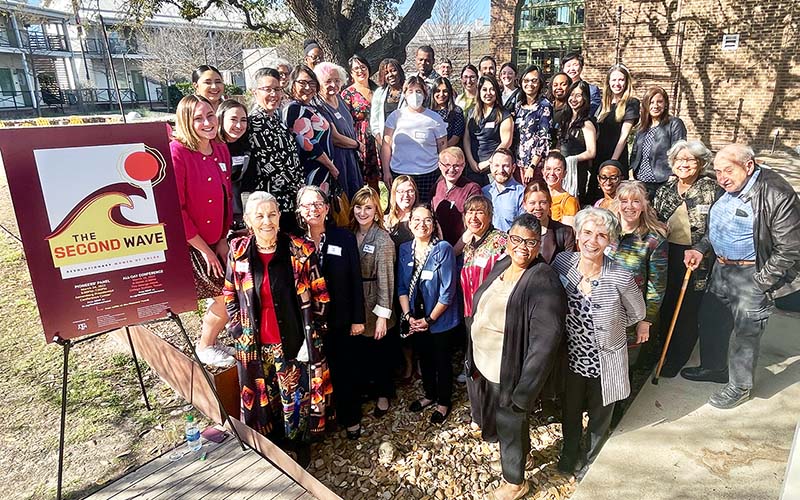Revolutionary Women of Color

Second Wave Conference Participants
For women of color in America, racism and sexism can only be understood in an intersectional framework. In late March, the History Department hosted a two-day conference, The Second Wave: Revolutionary Women of Color, to advance such scholarship and honor three pioneer activists from the 1960s and 1970s.
The signature event was “The Pioneer Panel” at Annenberg Presidential Conference Center, featuring presentations by Frances Beal of California, Martha Cortera of Texas, and Yvonne Swan of Washington. (Ms. Beal unfortunately fell ill before the event so Professor Ula Taylor of the University of California at Berkeley delivered her prepared remarks.) The panel sought to disprove a common myth that the idea that Second Wave feminism was a white, middle-class movement in which women of color took little interest or were excluded.
Beal’s comments concerned her own difficult decision to bring up sexism within the Black Civil Rights movement after the publication of Eldridge Cleaver’s book, Soul in Ice (1968), which blamed black women for being too assertive and advised greater subservience. Beal founded the Women’s Liberation Committee of the Student Non-Violent Coordinating Committee (SNCC) in 1969. Martha Cotera spoke movingly of her memories growing up in a deeply traditional Mexican household and being confused, even as a child, by the ways that gender roles were assigned indiscriminately, regardless of talent or interests. She described her later work as a founder of the La Raza Unida Party in 1970, and her efforts to encourage Chicanas to run for political office in the 1970s. Yvonne Swan, a member of the Sinixt tribe, spoke about the harrowing experience of being convicted of second-degree murder in 1972 for shooting a sex offender as he broke into her dwelling and advanced towards her and her children. Prosecutors argued that Swan should have used her fists instead of a gun, as a “reasonable man” would do. Feminist attorneys successfully took her case to the Washington Supreme Court, establishing an important legal precedent that helped generations of women afterwards.
On the second day of the conference, academic panels discussed the long-range effects of 1970s activism and methodological considerations for studying protest movements. Scholars came from universities around the nation, including Columbia University, City University of New York, University of California, University of Texas, University of Miami, and James Madison University. Dr. Elizabeth Cobbs, Melbern Glasscock Professor, organized the event with help from first-year graduate student Margaret Gregory and Department administrator Kelly Cook.
The Conference was generously sponsored by Africana Studies, the Carlos Cantu Hispanic Endowment, College of Liberal Arts, Department of History, Department of International Studies, Department of Sociology, Glasscock Center for Humanities Research, Glasscock Chair in American History, Latino/a and Mexican American Studies, Office of Graduate and Professional Studies, Race and Ethnic Studies, and Women and Gender Studies.
Patrick Grigsby
